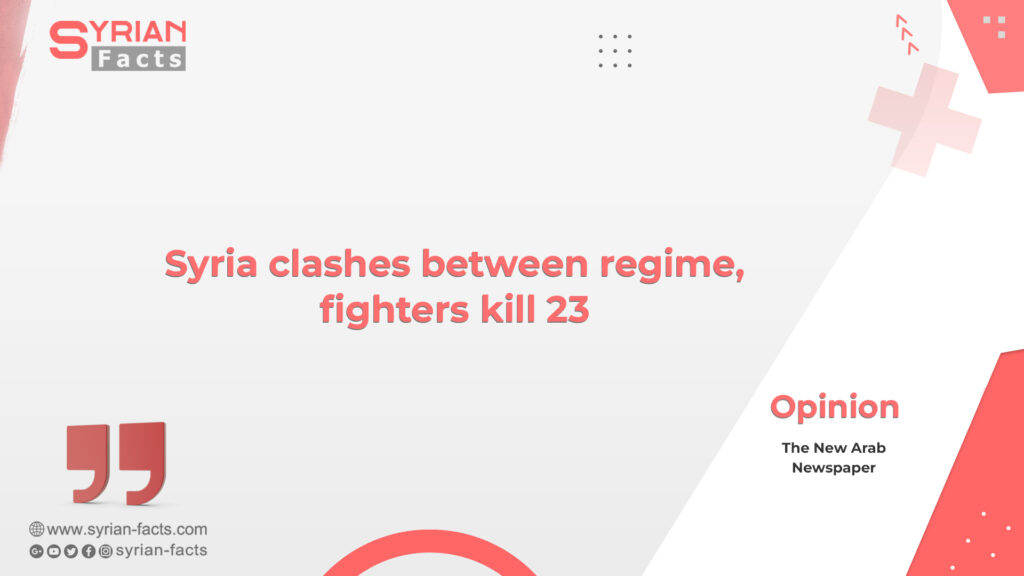23 fighters have been killed in clashes between the Syrian regime army and Turkish-backed rebel groups as US officials tried to mediate separate fighting between militias which are part of the Syrian Democratic Forces.
Clashes in Kurdish-held northeast Syria between the Syrian regime army and Turkey-backed armed factions killed 23 people on Sunday after pro-Ankara rebels attempted to infiltrate the area, a war monitor said.
The violence comes amid days of separate clashes in Kurdish-held parts of neighbouring Deir Ezzor province after US-backed, Kurdish-led fighters detained the head of a local military body there.
Rami Abdel Rahman, head of the Syrian Observatory for Human Rights, reported “18 dead among the (pro-Turkish) factions and five from the regime forces” in Hasakeh province on Sunday, adding that others were wounded.
The clashes took place in the Tal Tamr area in the province’s northwest, according to the Britain-based Observatory, which relies on a wide network of sources inside Syria.
Factions from the coalition of Ankara-backed rebel groups known as the Syrian National Army had sought to infiltrate the region earlier in the day, it added.
The Syrian army and local fighters affiliated with the Kurdish-led Syrian Democratic Forces (SDF) responded, leading to the casualties, the Observatory added.
The Tal Tamr area is near a strip of border territory under the control of Ankara and its proxies.
Since 2016, Turkey has launched several incursions against Kurdish forces in northern Syria that have allowed Ankara to gain control over areas along the border.
A 2019 Russian-brokered agreement saw Syrian regime forces deployed along parts of the northern border area in exchange for Turkey halting an earlier offensive.
Earlier Sunday, the US embassy in Syria said senior officials had met with Kurdish-led forces and community leaders in eastern Syria, discussing the need for de-escalation after days of deadly violence.
Fighting erupted in the Kurdish-controlled areas of Deir Ezzor province after the US-backed SDF detained Ahmad al-Khabil, the head of the local Deir Ezzor Military Council, on August 27.
The violence has killed 23 SDF fighters, 39 local fighters and nine civilians, according to the Observatory, updating an earlier toll for the days-long violence.
A curfew went into effect in the area on Saturday.
US Deputy Assistant Secretary of State for Near Eastern Affairs Ethan Goldrich and Major General Joel Vowell, commander of the US-led coalition fighting the Islamic State group in Syria and Iraq, met “in northeast Syria” with the SDF, Kurdish authorities and tribal leaders from Deir Ezzor, the American embassy said.
“They agreed on the importance of addressing the grievances” of Deir Ezzor residents, “the dangers of outsiders interfering” and “the need to avoid civilian deaths and casualties”, said an embassy statement on X, formerly Twitter.
The participants also agreed on “the need for de-escalation of violence as soon as possible”, said the statement from the US embassy, which is based outside Syria.
The largely Arab-majority Deir Ezzor province is controlled by the SDF to the east of the Euphrates, while Assad regime forces and Iran-affiliated militias are stationed on the west bank.
Kurdish authorities manage areas under their control through local civilian and military councils.
Some fighters in Turkish-held areas in northern Syria had urged support for those opposing the Kurdish-led forces in Deir Ezzor.
On Sunday, the SDF and the Observatory said the situation in Deir Ezzor appeared to be calming down.
The situation “is being handled with great sensitivity, but we hope the issues will be settled soon, whether militarily or in communication with the Arab tribes in the region”, SDF spokesman Farhad Shami said.
The SDF spearheaded the offensive that defeated the IS group’s self-declared caliphate in Syria in 2019.
Ankara sees the Syrian Kurdish People’s Protection Units (YPG), which dominate the SDF, as an offshoot of the banned Kurdistan Workers’ Party (PKK).
Syria’s war has killed more than half a million people since it broke out in 2011. mostly as a result of Assad-regime bombardment of civilian areas.





Be the first to write a comment.